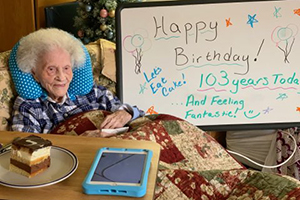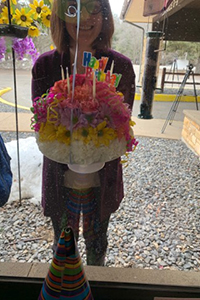Creativity, hand-written notes and video chats combat social isolation during epidemic
BY LISA EISENHAUER
April 2, 2020
When Jeanette Vincelli turned 103 in mid-March, her family couldn't hold their usual gathering to honor their matriarch.
Vincelli is a resident of the Benedictine Living Community of Wausau, Wisconsin, and as at skilled care centers and other health care facilities across the country, its administrators have followed the guidance of federal and state regulators to stem the spread of the deadly novel coronavirus. Part of that guidance calls for strict visitor limits.

Instead of sharing cake and hugs, some of Vincelli's relatives gathered at her window to wave and blow kisses. A couple dozen more wished her well from across the country through an online gathering using the Zoom video meeting app, which she took part in via an iPad with the help of the community's wellness director, Laura Storm.
The celebration was organized by Leah Gaworek, one of Vincelli's 19 grandchildren. Gaworek drove 101 miles from her home in Green Bay, Wisconsin, to stand at Vincelli's window with her husband and son. While they stayed outside, they sent a "cake" made of flowers and decorated with candles inside to the birthday girl.

It wasn't ideal, Gaworek said of the virtual party, but under the circumstances it was a workable option and it made her grandmother happy. She heard her "Nonny" tell Storm, "I have a wonderful family."
Gaworek was effusive in her praise for the Benedictine staffers who helped Vincelli participate in the Zoom event, decorated her room and served the centenarian an edible birthday cake. "The staff at Benedictine just did a phenomenal job of making her feel special," Gaworek said.
Finding workarounds
The Wausau nursing home is part of Benedictine, which also has senior living communities in Minnesota, North Dakota, Missouri and Illinois. The system is limiting visits to "specific, limited compassionate care situations," its website says. COVID-19, the illness caused by the novel coronavirus, has shown to be especially dangerous for the older population and to spread quickly in communal living spaces. Through March, no patients, residents or staff at Benedictine communities had contracted COVID-19.
Janice Kivela Hooey, Benedictine's community relations manager, said staff at all of its communities are doing their best to find safe workarounds to the family separations. Those efforts include setting up appointments and providing technology for virtual visits with family and friends and organizing a "#gramsforgrands" campaign on social media to encourage the public to send cards and drawings to cheer up isolated residents.
"We're really trying hard to keep spirits up because social isolation is a real concern of ours," Hooey said.
Outside visitors are not the only ones affected by the coronavirus-related restrictions. Benedictine is following Centers for Medicare and Medicaid Services' guidance for social distancing because of the COVID-19 risk. For example, while most meals are being served in residents' rooms, some communities are serving them in rotating shifts that allow residents to eat together but at seats at least six feet apart.
Tough decisions
Hooey said in general the response to the visitor restrictions has been supportive inside and outside of the Benedictine communities. "I think people are recognizing that this is a different thing and that we're doing the work that we need to do, so they're being very understanding," Hooey said.
At Benedictine and elsewhere, those who were in on decisions to keep most visitors out for both COVID-19 patients and other patients say the restrictions weren't enacted lightly.
Providence St. Joseph Health, like many systems, is allowing only limited visitors for pediatric, neonatal intensive care and obstetrics patients and in end-of-life circumstances. Providence St. Joseph operates in seven western states, including Washington and California, which have been hit hard by the COVID-19 pandemic.
Dr. Joanne Roberts, the system's senior vice president and chief value officer, said the main reason the system put the strict visitor restrictions in place was to reduce the risk of transmission of COVID-19. But she said the move also is helping conserve the scarce supply of personal protective equipment, such as masks and gloves, being issued to anyone coming near infected patients or rooms where they are receiving care.
As at other places, Providence St. Joseph facilities have cut down on entry points and staffers are screening the few visitors who are allowed in for signs of the sickness such as fever.
"Our communities have been wonderful in supporting whatever measures we believe will reduce transmission in our facilities and in our communities," Roberts said. "These decisions have been made with community input, and while they are painful for all, they are highly supported."
Explanations posted
Like other systems and hospitals, Bon Secours Mercy Health has added a special section to its website focused on its coronavirus response and explaining its visiting restrictions. Carol Billingsley, the system's director of public relations and communications, said its policies have been crafted by a COVID-19 task force.
"Our protocols and decisions are consistent with Centers for Disease Control and Prevention guidelines," Billingsley said. "That was the basis for decisions regarding visitor restrictions."
St. Louis-based Mercy rolled out visitor policies across its four-state service area that have only minor variations, such as hours, among the sites. Obstetrics patients can have one visitor while pediatrics patients and infants in the NICU can have two. For the pediatric patients, those two visitors have to stay the same for the length of the child's stay and the visitors can't be the child's siblings.
Mercy's press release about the visitor restrictions noted: "Exceptions will be made for compassionate care circumstances."
Many systems have closed facilities, especially clinics, amid the pandemic. Some of those that have kept some in operation, including Duluth, Minnesota-based Essentia Health, are asking patients to attend their appointments alone. Its limited exceptions include one person being allowed to accompany children, obstetric patients and adult patients who need assistance.
In addition to the visitor restrictions, hospitals are closing related services, such as gift shops. CHI Saint Joseph Health based in Lexington, Kentucky, has temporarily shuttered the shops run by volunteers at five Kentucky hospitals. "Many volunteers at CHI Saint Joseph Health are over age 60 and are particularly vulnerable should they be infected with COVID-19," the system, part of CommonSpirit Health, said in a press release.
Longing to connect
Most systems are encouraging visitors to use phones and social media sites and apps to stay in touch with hospitalized relatives. Some, such as Avera Health, are setting up "virtual visitation" processes so friends and relatives can get some screen time with patients.
While being careful to explain that the restrictions are scientifically based, Sioux Falls, South Dakota-based Avera Health is expressing empathy. In the post about the visitor restrictions on Avera's website, Dr. David Erickson, the system's chief medical and innovation officer says: "We understand that these restrictions will be difficult for patients, family members, friends and loved ones."
Benedictine is among systems allowing visitors in for all dying patients, so long as those visitors pass the COVID-19 screenings. Jeri Reinhardt, vice president, clinical services and performance excellence at Benedictine, said this exception comes directly from CMS guidance, although based on media reports some hospitals appear to be banning visitors for COVID-19 patients, even those who are dying
"We respect the end of life so deeply, as I think everybody does, and so we make that provision possible," Reinhardt said.
